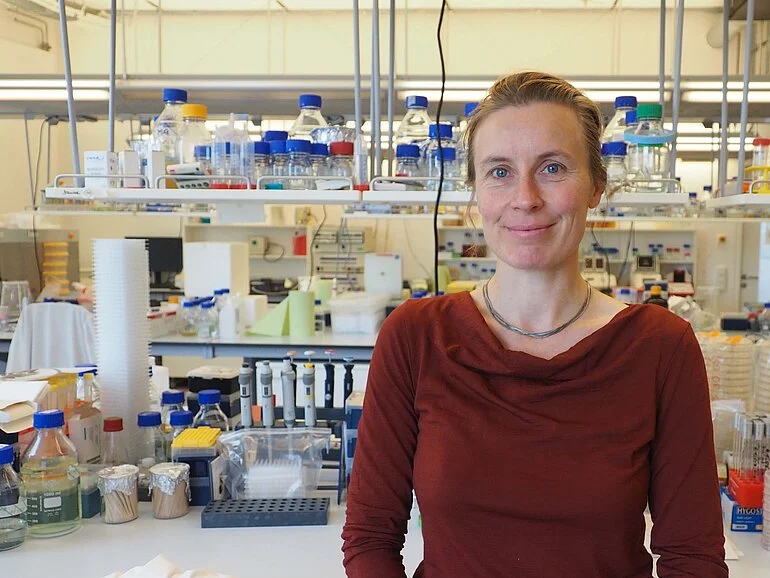
Prof. Dr. rer. nat. Eva Holtgrewe-Stukenbrock
Full member
Kiel University
Botanical Institute
Environmental Genomics
PI
Am Botanischen Garten 9
24118 Kiel
Room: 505
Information about Prof. Dr. Eva Stukenbrock
Eva Stukenbrock is interested in the evolution of plant pathogens. Her research has notably focused on the impact of crop domestication and agriculture on the emergence of new pathogen species.
Research in the group of E. Stukenbrock integrates computational analyses and experimental approaches. In the framework of the Excellence Cluster ROOTS, the research has focused on genetic data from historical plant remains from different time points; from the Neolithic to the Medieval time with the aim of understanding the impact of domestication and breeding on plant diversity.
Qualifications and Career
Year | Activity | Place |
|---|---|---|
| Since 2014 | Professor (W3) | Kiel University & MPI Plön, Germany |
| 2012–2014 | Max Planck Research Group leader | MPRG Fungal Biodiversity, Max Planck Institute for Terrestrial Microbiology, Marburg, Germany |
| 2010–2012 | Project group leader | Max Planck Institute for Terrestrial Microbiology, Marburg, Germany |
| 2008–2010 | PostDoc | Bioinformatics Research Center, University of Aarhus, Denmark |
| 2007 | PostDoc | Plant Pathology, ETH Zurich, Switzerland |
| 2004-2007 | Doctorate | ETH Zurich, Switzerland |
| 1998–2004 | Studies in Biology: M.Sc. in Biology | University of Copenhagen, Denmark |
Selected Publications
- Stukenbrock E, Gurr S (2023) Address the growing urgency of fungal disease in crops. Nature 617:31–34.
- Feurtey, Alice, et al. "A thousand-genome panel retraces the global spread and adaptation of a major fungal crop pathogen." Nat Comm. 14.1 (2023): 1059.
- Seybold H, Demetrowitsch T, Hassani MA, Szymczak S, Reim E, Haueisen J, Rühlemann M, Franke A, Schwarz K, Stukenbrock EH (2020) Hemibiotrophic fungal pathogen induces systemic susceptibility and systemic shifts in wheat metabolome and microbiome composition. Nat Commun 11(1), pp.1-12.
- Möller M, Schotanus K, Soyer J, Haueisen J, Happ K, Stralucke M, Happel P, Smith KM, Connolly LR, Freitag M, Stukenbrock EH (2019) Destabilization of chromosome structure by histone H3 lysine 27 methylation. PLoS Genet 5(4), p.e1008093.
- Habig M, Kema G, Stukenbrock E (2018) Meiotic drive of female-inherited supernumerary chromosomes in a pathogenic fungus. eLife e40251.
- Stukenbrock EH and Dutheil JY (2018) Comparison of fine-scale recombination maps in fungal plant pathogens reveals dynamic recombination landscapes and intragenic hotspots. Genetics 208(3): 1209-1229.
- Habig M, Quade J, Stukenbrock EH (2017) Forward genetics approach reveals host-genotype dependent importance of accessory chromosomes in the fungal wheat pathogen Zymoseptoria tritici. mBio 8.6: e01919-17.
- Möller M and Stukenbrock EH (2017) Evolution and genome architecture in fungal plant pathogens. Nat Rev Microbiol 15, 756–771.
- Schotanus K, Soyer J, Connolly L, Grandabuert J, Happel P, Smith K, Freitag M, Stukenbrock EH (2015) Histone modifications rather than the novel regional centromeres of Zymoseptoria tritici distinguish core and accessory chromosomes. Epigenetics Chromatin 8:41.
- Poppe S, Dorsheimer L, Happel P, Stukenbrock EH (2015) Rapidly evolving genes are key players in host specialization and virulence of the fungal wheat pathogen Zymoseptoria tritici (Mycosphaerella graminicola). PLoS Path 11(7): e1005055.
Academic Distinctions
- 2023, ERC Consolidator grant “FungalSecrets”
- 2022, Elected Associated Member, the French Academy of Science
- Since 2020, Elected Academy Fellow, the American Academy of Microbiology
- 2014-2024, 2x Max-Planck Fellowship, Max Planck Institute for Evolutionary Biology, Plön, Germany
- 2012–2014, Fellowship from the Max Planck Society. With this funding E.H. Stukenbrock established the independent Max Planck Research Group “Fungal Biodiversity” at the Max Planck Institute for Terrestrial Microbiology in Marburg, Germany.
- 2008 L’Oreal Foundation for women in science awardee
- 2007 ETH Gold Medal for Outstanding PhD dissertation

